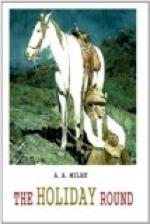. . . . . . .
You must have seen me wearing it in the dear old days. Greeny brown it was in colour; but it wasn’t the colour that drew your eyes to it—no, nor yet the shape, nor the angle at which it sat. It was just the essential rightness of it. If you have ever seen a hat which you felt instinctively was a clever hat, an alive hat, a profound hat, then that was my hat—and that was myself underneath it.
NAPOLEON AT WORK
When I am in any doubt or difficulty I say to myself, “What would Napoleon have done?” The answer generally comes at once: “He would have borrowed from Henry,” or “He would have said his aunt was ill”—the one obviously right and proper thing. Then I weigh in and do it.
“What station is this?” said Beatrice, as the train began to slow up. “Baby and I want to get home.”
“Whitecroft, I expect,” said John, who was reading the paper. “Only four more.”
“It’s grown since we were here last,” I observed. “Getting quite a big place.”
“Good; then we’re at Hillstead. Only three more stations.”
I looked out of the window, and had a sudden suspicion.
“Where have I heard the name Byres before?” I murmured thoughtfully.
“You haven’t,” said John. “Nobody has.”
“Say ‘Byres,’ baby,” urged Beatrice happily.
“You’re quite sure that there isn’t anything advertised called ‘Byres’? You’re sure you can’t drink Byres or rub yourself down with Byres?”
“Quite.”
“Well, then, we must be at Byres.”
There was a shriek from Beatrice, as she rushed to the window.
“We’re in the wrong train—Quick! Get the bags!—Have you got the rug?—Where’s the umbrella?—Open the window, stupid!”
I got up and moved her from the door.
“Leave this to me,” I said calmly.
“Porter!—
Porter!!—Porter!!!—Oh,
guard, what station’s this?”
“Byres, sir.”
“Byres?”
“Yes, sir.” He blew his whistle and the train went on again.
“At any rate we know now that it was Byres,” I remarked, when the silence began to get oppressive.
“It’s all very well for you,” Beatrice burst out indignantly, “but you don’t think about Baby. We don’t know a bit where we are—”
“That’s the one thing we do know,” I said. “We’re at this little Byres place.”
“It was the porter’s fault at Liverpool Street,” said John consolingly. “He told us it was a through carriage.”
“I don’t care whose fault it was; I’m only thinking of Baby.”
“What time do babies go to bed as a rule?” I asked.
“This one goes at six.”
“Well, then, she’s got another hour. Now, what would Napoleon have done?”
“Napoleon,” said John, after careful thought, “would have turned all your clothes out of your bag, would have put the baby in it diagonally, and have bored holes in the top for ventilation. That’s as good as going to bed—you avoid the worst of the evening mists. And people would only think you kept caterpillars.”




